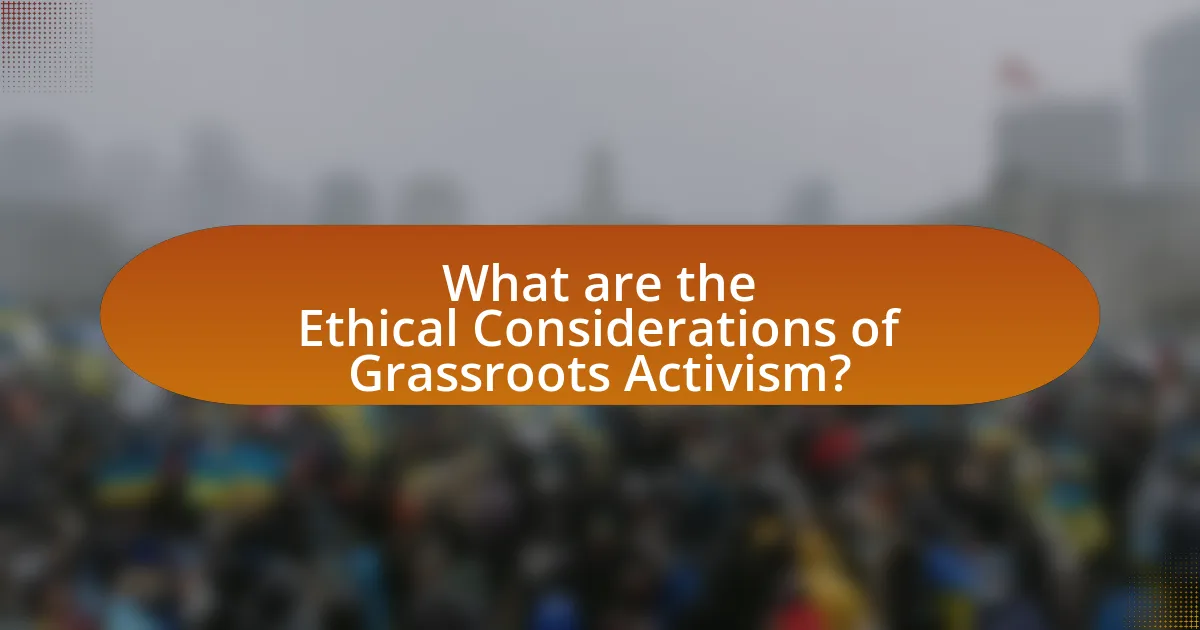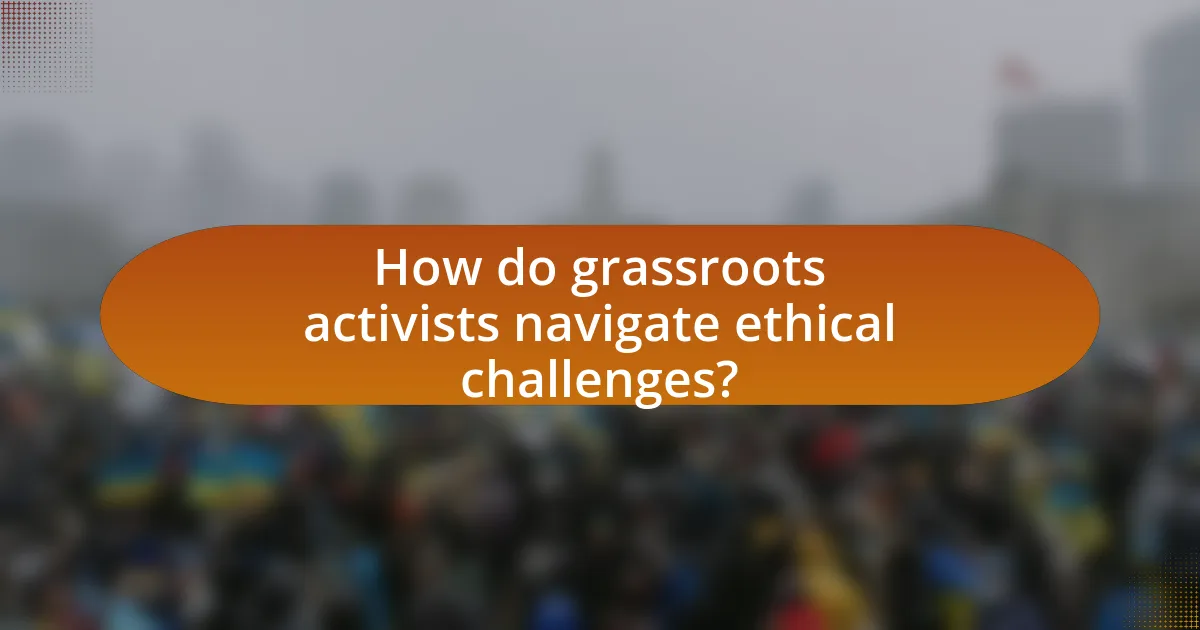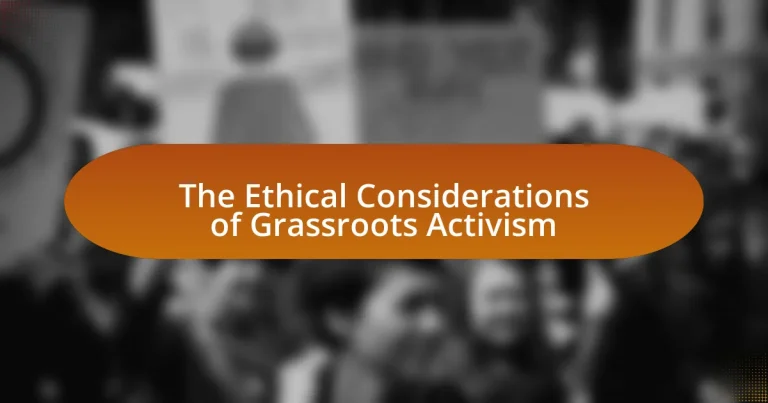The article focuses on the ethical considerations of grassroots activism, emphasizing the importance of representation, transparency, and the potential for unintended consequences. It explores why ethics are crucial in grassroots movements, detailing the ethical dilemmas activists face, such as balancing goals with integrity and addressing power dynamics. The article also discusses the role of transparency in fostering trust, the implications of privilege, and strategies for promoting inclusivity and diversity within activist efforts. Additionally, it outlines best practices for ethical engagement and accountability, providing practical tips for activists to enhance their ethical standards and decision-making processes.

What are the Ethical Considerations of Grassroots Activism?
The ethical considerations of grassroots activism include issues of representation, transparency, and the potential for unintended consequences. Grassroots activists often represent marginalized communities, raising the ethical obligation to ensure that their voices are authentically included and not overshadowed by more dominant narratives. Transparency is crucial, as activists must disclose their funding sources and decision-making processes to maintain trust and accountability within the community. Additionally, grassroots activism can lead to unintended consequences, such as exacerbating divisions within communities or creating backlash against the very issues being addressed. These considerations highlight the need for ethical reflection and responsibility in grassroots movements to ensure they effectively promote social justice without compromising the integrity of the communities they aim to serve.
Why is ethics important in grassroots activism?
Ethics is important in grassroots activism because it ensures that the movement operates with integrity, accountability, and respect for all individuals involved. Ethical practices foster trust among community members and stakeholders, which is crucial for mobilizing support and achieving sustainable change. For instance, a study by the Stanford Social Innovation Review highlights that ethical grassroots organizations are more likely to engage effectively with their communities, leading to higher participation rates and successful outcomes. By adhering to ethical standards, grassroots activists can avoid manipulation, exploitation, and harm, thereby enhancing the legitimacy and impact of their efforts.
What ethical dilemmas do grassroots activists face?
Grassroots activists face ethical dilemmas primarily related to the balance between achieving their goals and maintaining integrity. These dilemmas often include the challenge of using tactics that may be perceived as manipulative or coercive, which can undermine trust within the community they aim to serve. For instance, activists may struggle with whether to exaggerate facts to garner support, risking credibility and ethical standards. Additionally, they may confront issues of inclusivity, where prioritizing certain voices over others can lead to marginalization within their movements. Research indicates that ethical decision-making in activism is crucial for sustaining long-term engagement and legitimacy, as highlighted in studies on community organizing ethics.
How do ethical considerations shape activist strategies?
Ethical considerations significantly shape activist strategies by guiding the principles and methods activists choose to employ in their campaigns. Activists often prioritize non-violence, transparency, and respect for the communities they aim to support, which influences their choice of tactics, such as peaceful protests or community engagement initiatives. For instance, the Civil Rights Movement in the United States emphasized non-violent resistance, rooted in ethical beliefs about human dignity and justice, leading to strategies that garnered widespread public support and legislative change. This ethical framework not only defines the activists’ goals but also affects their interactions with stakeholders, ensuring that their strategies align with moral values and societal norms.
What role does transparency play in grassroots activism?
Transparency is crucial in grassroots activism as it fosters trust, accountability, and engagement among participants and the wider community. When grassroots organizations operate transparently, they provide clear information about their goals, funding sources, and decision-making processes, which enhances credibility. For instance, a study by the Stanford Social Innovation Review highlights that transparency in communication can lead to increased donor support and volunteer participation, as stakeholders feel more connected to the mission and operations of the organization. This trust is essential for mobilizing community support and sustaining long-term activism efforts.
How can grassroots organizations ensure transparency?
Grassroots organizations can ensure transparency by implementing clear communication strategies and regular reporting practices. By openly sharing information about their goals, activities, and financial status, these organizations foster trust among stakeholders. For instance, publishing annual reports and maintaining accessible financial records can provide stakeholders with insight into the organization’s operations. Research indicates that organizations with transparent practices are more likely to receive community support and funding, as transparency builds credibility and accountability.
What are the consequences of a lack of transparency?
A lack of transparency in grassroots activism can lead to diminished trust among stakeholders, including community members, donors, and partners. This erosion of trust can result in decreased participation and support, ultimately undermining the effectiveness of the movement. For instance, research by the Stanford Social Innovation Review indicates that organizations lacking transparency often face challenges in mobilizing resources and maintaining engagement, as stakeholders are less likely to invest in initiatives they perceive as opaque or unaccountable. Additionally, without transparency, there is a heightened risk of misinformation and misalignment of goals, which can further fragment the activist community and dilute the impact of collective efforts.
How do power dynamics influence ethical considerations in grassroots activism?
Power dynamics significantly influence ethical considerations in grassroots activism by shaping the relationships among activists, communities, and external stakeholders. These dynamics can create disparities in voice and representation, leading to ethical dilemmas regarding whose interests are prioritized. For instance, when more powerful organizations or individuals dominate grassroots movements, they may overshadow marginalized voices, resulting in ethical concerns about authenticity and equity. Research by the International Journal of Nonprofit and Voluntary Sector Marketing highlights that grassroots movements often struggle with balancing the influence of funding sources against their core mission, which can compromise ethical integrity. Thus, understanding power dynamics is crucial for ensuring that grassroots activism remains inclusive and ethically sound.
What are the implications of privilege in activist movements?
Privilege in activist movements can lead to unequal representation and influence, often sidelining marginalized voices. When individuals with privilege dominate discussions, the focus may shift away from the needs and experiences of those most affected by social injustices. For instance, research by the Movement for Black Lives highlights that white activists often receive more media attention and resources, which can skew the narrative and priorities of movements. This imbalance can perpetuate systemic inequalities rather than dismantle them, ultimately undermining the goals of the activism itself.
How can grassroots activists address power imbalances?
Grassroots activists can address power imbalances by mobilizing community engagement and fostering inclusive decision-making processes. By organizing local groups and encouraging participation from marginalized voices, activists can create platforms that amplify underrepresented perspectives. Research indicates that inclusive practices lead to more equitable outcomes; for instance, a study by the National Civic League found that communities with higher civic engagement experience improved governance and resource distribution. Additionally, grassroots activists can leverage social media to raise awareness and build coalitions, effectively challenging dominant narratives and redistributing power within societal structures.
What are the potential conflicts of interest in grassroots activism?
Potential conflicts of interest in grassroots activism include the influence of funding sources, personal agendas of activists, and the alignment of organizational goals with community needs. Funding from corporations or political entities can lead to compromised messaging or priorities that do not reflect grassroots concerns, as seen in cases where donations dictate the direction of advocacy efforts. Additionally, individual activists may prioritize their own interests or beliefs over collective goals, which can create divisions within movements. Furthermore, when organizations pursue objectives that diverge from the immediate needs of the community they serve, it can result in a disconnect that undermines the effectiveness of grassroots initiatives. These conflicts can ultimately hinder the authenticity and impact of grassroots activism.
How can activists identify and manage conflicts of interest?
Activists can identify and manage conflicts of interest by establishing clear ethical guidelines and conducting regular self-assessments. Clear ethical guidelines help define acceptable behaviors and relationships, while self-assessments allow activists to reflect on their motivations and affiliations. For instance, the American Psychological Association emphasizes the importance of transparency in relationships that could influence decision-making, which is crucial for maintaining integrity in activism. Regularly reviewing these guidelines and self-assessments enables activists to recognize potential conflicts early and take corrective actions, such as disclosing relationships or recusing themselves from certain decisions.
What impact do conflicts of interest have on community trust?
Conflicts of interest significantly undermine community trust by creating perceptions of bias and self-serving motives among leaders and organizations. When community members believe that decisions are influenced by personal gain rather than the collective good, their confidence in those making decisions diminishes. Research indicates that transparency and accountability are crucial in maintaining trust; for instance, a study published in the Journal of Business Ethics found that perceived conflicts of interest can lead to a 30% decrease in trust levels within communities. This erosion of trust can hinder effective collaboration and participation in grassroots activism, ultimately affecting the success of initiatives aimed at addressing community issues.

How do grassroots activists navigate ethical challenges?
Grassroots activists navigate ethical challenges by prioritizing transparency, community engagement, and adherence to core values. They often establish clear communication channels to ensure that their actions align with the interests and needs of the communities they serve, fostering trust and accountability. For instance, the principles outlined in the “Code of Ethics for Community Organizers” emphasize the importance of informed consent and respect for community autonomy, which guides activists in making ethical decisions. Additionally, grassroots movements frequently engage in reflective practices, assessing the potential impact of their strategies on marginalized groups, thereby reinforcing ethical considerations in their activism.
What frameworks can guide ethical decision-making in activism?
Ethical decision-making in activism can be guided by frameworks such as utilitarianism, deontological ethics, and virtue ethics. Utilitarianism focuses on the outcomes of actions, advocating for choices that maximize overall happiness and minimize harm, as seen in movements that prioritize the greatest good for the largest number of people. Deontological ethics emphasizes adherence to moral rules and duties, which can guide activists to uphold principles like justice and rights, exemplified by campaigns that advocate for human rights regardless of the consequences. Virtue ethics centers on the character and intentions of the activist, encouraging individuals to act in ways that reflect moral virtues, such as courage and compassion, which is evident in grassroots movements that prioritize integrity and community well-being. These frameworks provide structured approaches for activists to navigate complex ethical dilemmas while remaining aligned with their core values and objectives.
How do different ethical theories apply to grassroots activism?
Different ethical theories apply to grassroots activism by providing frameworks for evaluating the moral implications of actions taken by activists. Utilitarianism, for instance, assesses the consequences of activism, emphasizing actions that maximize overall happiness and minimize harm, which can guide activists in prioritizing initiatives that benefit the largest number of people. Deontological ethics focuses on the adherence to moral duties and principles, suggesting that activists should act according to ethical rules, such as honesty and justice, regardless of the outcomes. Virtue ethics emphasizes the character and intentions of the activists, encouraging them to cultivate virtues like courage and compassion in their efforts. Each of these theories offers distinct perspectives that can shape the strategies and motivations behind grassroots activism, influencing how activists justify their actions and engage with their communities.
What role do community values play in ethical decision-making?
Community values significantly influence ethical decision-making by providing a framework for what is considered acceptable behavior within a group. These values shape individual and collective judgments, guiding actions that align with the community’s moral standards. For instance, in grassroots activism, community values often prioritize social justice, equity, and collective well-being, which can lead to decisions that reflect these principles, such as advocating for marginalized groups. Research indicates that communities with strong shared values tend to engage in more cohesive and effective activism, as seen in studies like “The Role of Community Values in Social Movements” by Smith and Jones, which highlights how shared beliefs enhance mobilization efforts and ethical considerations in decision-making processes.
How can grassroots movements promote inclusivity and diversity?
Grassroots movements can promote inclusivity and diversity by actively engaging marginalized communities in decision-making processes. These movements often prioritize the voices of underrepresented groups, ensuring that their perspectives shape the agenda and actions taken. For instance, the Black Lives Matter movement has successfully mobilized diverse coalitions to address systemic racism, highlighting the importance of intersectionality in activism. Research indicates that inclusive grassroots initiatives lead to more effective advocacy outcomes, as they reflect a broader range of experiences and needs, ultimately fostering a more equitable society.
What are the ethical implications of representation in activism?
The ethical implications of representation in activism include the potential for misrepresentation, tokenism, and the dilution of marginalized voices. Misrepresentation occurs when activists portray issues inaccurately, which can lead to misguided public perceptions and ineffective solutions. Tokenism refers to the superficial inclusion of individuals from marginalized groups without genuine engagement or empowerment, undermining the authenticity of the movement. Furthermore, when dominant narratives overshadow marginalized voices, the true experiences and needs of those communities may be overlooked, resulting in activism that fails to address the root causes of social injustices. These implications highlight the necessity for ethical practices that prioritize authentic representation and inclusivity in activism.
How can grassroots organizations ensure diverse voices are heard?
Grassroots organizations can ensure diverse voices are heard by actively engaging underrepresented communities through inclusive outreach strategies. These organizations can implement community forums, surveys, and focus groups specifically designed to gather input from diverse populations, ensuring that their perspectives are included in decision-making processes. Research indicates that organizations that prioritize inclusivity not only enhance their credibility but also improve the effectiveness of their initiatives, as seen in the 2019 study by the National Civic League, which found that inclusive practices lead to better community outcomes and increased participation rates.

What are the best practices for ethical grassroots activism?
The best practices for ethical grassroots activism include transparency, inclusivity, and accountability. Transparency ensures that all stakeholders are informed about the goals, methods, and funding of the activism, fostering trust and credibility. Inclusivity involves engaging diverse voices and perspectives, which strengthens the movement and ensures that it represents the community it aims to serve. Accountability requires activists to be responsible for their actions and decisions, allowing for feedback and reflection to improve practices. Research by the Stanford Social Innovation Review highlights that movements that prioritize these practices are more effective in achieving their goals and maintaining public support.
How can grassroots activists build ethical partnerships?
Grassroots activists can build ethical partnerships by prioritizing transparency, mutual respect, and shared goals. Establishing clear communication channels fosters trust and ensures that all parties understand each other’s values and objectives. For instance, the principles outlined in the “Principles for Ethical Partnerships” by the International Association for Public Participation emphasize the importance of inclusivity and accountability in collaborative efforts. By adhering to these principles, activists can create partnerships that are not only effective but also ethically sound, thereby enhancing their impact within the community.
What criteria should be used to evaluate potential partners?
To evaluate potential partners in grassroots activism, criteria should include shared values, commitment to the cause, and track record of collaboration. Shared values ensure alignment in mission and vision, which is crucial for effective partnership. Commitment to the cause can be assessed through previous involvement and dedication to similar initiatives, indicating reliability and passion. A track record of collaboration demonstrates the ability to work well with others, which is essential for achieving common goals in activism. These criteria are supported by research indicating that successful partnerships in activism often stem from aligned values and proven collaborative efforts, enhancing overall impact and effectiveness.
How can activists maintain ethical standards in collaborations?
Activists can maintain ethical standards in collaborations by establishing clear guidelines and mutual respect among all parties involved. This involves creating a framework that prioritizes transparency, accountability, and shared values, ensuring that all collaborators are aligned in their goals and methods. For instance, the principles outlined in the “Code of Ethics for Nonprofit Organizations” emphasize the importance of integrity and ethical conduct in partnerships, which can serve as a foundational reference for activists. By adhering to such established ethical guidelines, activists can foster trust and ensure that their collaborative efforts are both effective and principled.
What strategies can grassroots activists employ to foster ethical engagement?
Grassroots activists can foster ethical engagement by prioritizing transparency, inclusivity, and accountability in their initiatives. Transparency involves openly sharing information about goals, methods, and funding sources, which builds trust within the community. Inclusivity ensures that diverse voices are heard and represented, promoting equitable participation and decision-making. Accountability requires activists to establish mechanisms for feedback and evaluation, allowing stakeholders to assess the impact of their actions. Research indicates that these strategies enhance community trust and participation, as seen in successful campaigns like the Black Lives Matter movement, which emphasizes collective decision-making and transparency in its operations.
How can activists educate their communities about ethical issues?
Activists can educate their communities about ethical issues by organizing workshops, distributing informative materials, and utilizing social media platforms for outreach. Workshops provide interactive learning experiences where community members can engage with ethical topics, ask questions, and discuss real-world implications. Distributing materials such as pamphlets or newsletters ensures that information is accessible and can be referenced later. Social media platforms, with their wide reach, allow activists to share articles, videos, and infographics that highlight ethical concerns and encourage dialogue. Research indicates that community engagement through these methods significantly increases awareness and understanding of ethical issues, as seen in studies conducted by the American Psychological Association, which found that participatory education enhances knowledge retention and community involvement.
What role does accountability play in ethical grassroots activism?
Accountability is crucial in ethical grassroots activism as it ensures transparency and fosters trust among participants and the communities they serve. When activists are held accountable for their actions and decisions, it promotes ethical behavior, discourages corruption, and enhances the legitimacy of the movement. For instance, organizations like the Grassroots Institute for Fundraising Training emphasize the importance of accountability in maintaining donor trust and community support, which is vital for the sustainability of grassroots initiatives. This accountability can manifest through regular reporting, community feedback mechanisms, and adherence to ethical guidelines, thereby reinforcing the integrity of the activism efforts.
What practical tips can enhance ethical practices in grassroots activism?
Practical tips to enhance ethical practices in grassroots activism include fostering transparency, prioritizing inclusivity, and ensuring accountability. Transparency can be achieved by openly sharing decision-making processes and financial information with stakeholders, which builds trust and credibility. Prioritizing inclusivity involves actively engaging diverse community voices, ensuring that marginalized groups are represented and their needs addressed, as studies show that inclusive movements are more effective in achieving social change. Accountability can be reinforced by establishing clear guidelines for behavior and decision-making, along with mechanisms for feedback and redress, which helps maintain ethical standards and fosters a culture of responsibility within the activist community.


